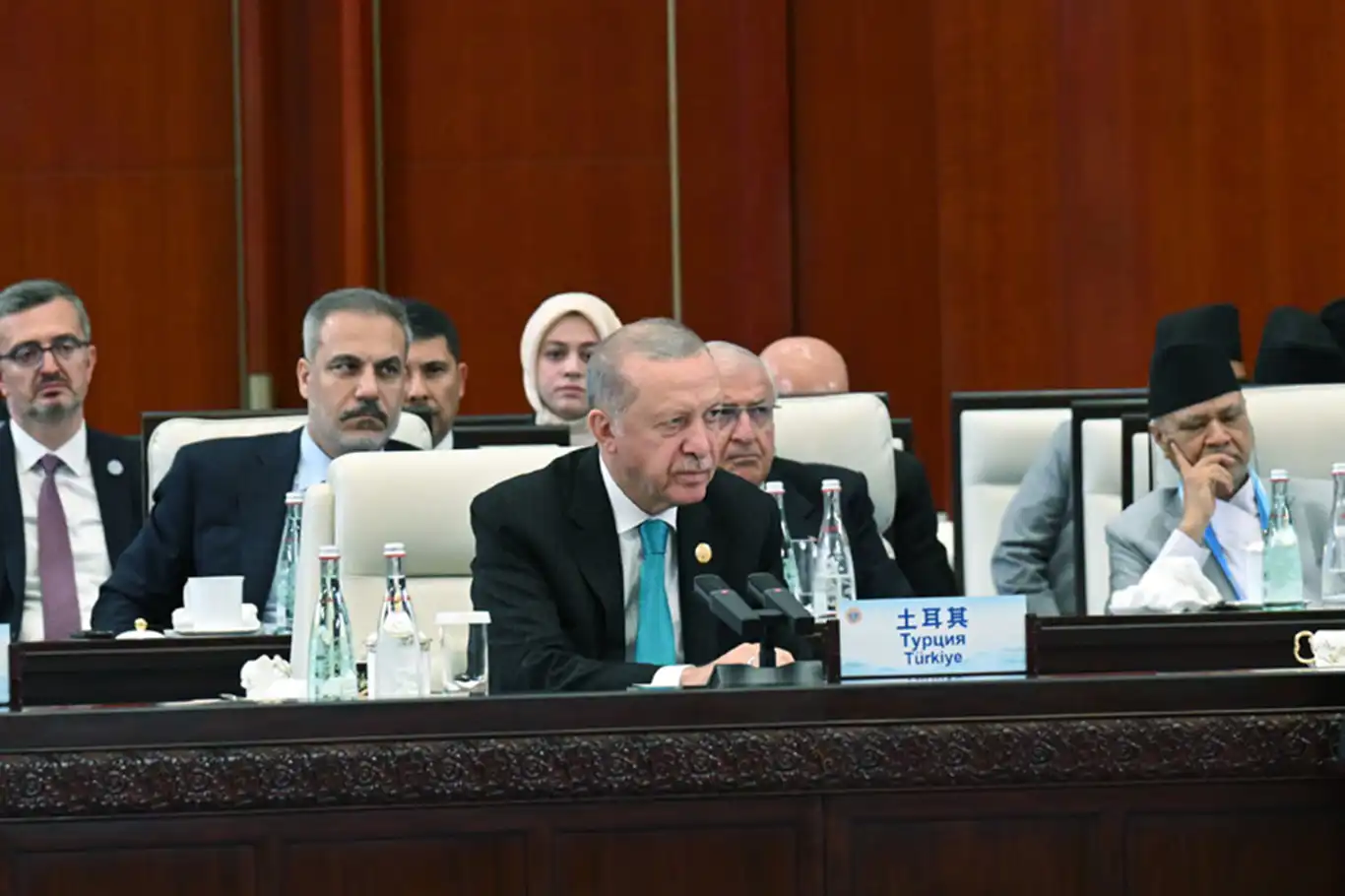Türkiye’s Erdoğan slams UN failure to stop Gaza genocide


Turkish President Recep Tayyip Erdoğan delivered a powerful address at the “SCO Plus” session of the 25th Shanghai Cooperation Organization (SCO) summit, urging global action to end the 23-month-long atrocities in Gaza and calling for a major overhaul of the United Nations.
Addressing heads of state from Asia, the Middle East, and beyond, Erdoğan lamented that nearly two years have passed since Israel began its devastating military campaign against the Palestinian enclave, yet the global community has been unable to stop the bloodshed.
“There can be no excuse for failing, for 23 months, to stop the atrocities in Gaza in which babies, children and the elderly are being starved to death,” Erdoğan said. “If the international community is unable to prevent over 63,000 Gazans, mostly children, women, and the elderly, from being massacred and is unable to stop innocent infants from being starved to death, then we must all sit down and think.”
The Turkish leader underscored that what is happening in Gaza is not just a regional crisis, but a test of the world’s conscience and the credibility of global institutions. He expressed gratitude to “all friends and all voices of conscience who speak up for Palestine,” noting that the struggle of the Palestinian people in Gaza and the West Bank represents a broader demand for justice.
Central to Erdoğan’s message was a demand for deep reform of the United Nations, which he argued is trapped in structures created in the aftermath of World War II and incapable of addressing today’s crises.
“Global problems can be resolved only by increasing our efforts on the basis of cooperation and effective multilateralism,” Erdoğan said. “The point where this can be realized is the multilateral system, at the heart of which lies the United Nations. However, it seems that the United Nations is in need of a serious reform in order to fulfill its responsibilities.”
He emphasized that Secretary-General António Guterres has made commendable efforts, but the UN Security Council – dominated by a handful of permanent members – has repeatedly failed to act on Gaza and other urgent issues. “The current system, dictated by the circumstances of 80 years ago, is incapable of fulfilling what is expected of it,” Erdoğan noted.
Beyond Gaza, Erdoğan also turned attention to Syria, stressing that the region now faces historic opportunities to restore peace and stability. Türkiye, he said, remains committed to supporting Syria’s reconstruction while defending its territorial integrity.
“In Syria, doors have now opened for a new era offering historic opportunities for lasting regional peace and stability,” he said. “We will continue to stand against any attempt that threatens the security and territorial integrity of our neighbor Syria.”
The president framed this as part of Türkiye’s broader role as a stabilizing actor in its region – seeking solutions based not on domination but on cooperation and mutual respect.
Erdoğan’s speech also placed strong emphasis on economic and strategic projects across Asia, the Middle East, and Europe. He welcomed recent progress in the South Caucasus and Central Asia, describing it as a chance to build stronger financial, commercial, and infrastructural ties.
“Our close cooperation with the brotherly countries in Central Asia continues to grow stronger in bilateral and multilateral platforms,” he said, highlighting Türkiye’s contributions within the Organization of Turkic States. “These steps will not only strengthen our economies but also enhance regional peace.”
On the global level, Erdoğan pointed to Türkiye’s preparations for hosting COP31 World Leaders Climate Action Summit in 2026, linking environmental issues with energy security and sustainable growth.
“Türkiye sees developments in the field of energy and connectivity as vital for global stability, economic development, energy supply security, and sustainable growth,” he underlined. “The Shanghai Cooperation Organization is a critical platform for improving energy security and establishing partnerships on strategic infrastructure projects.”
Erdoğan also reiterated Türkiye’s ambition to revive historical trade routes and modernize connectivity through large-scale projects. The Trans-Caspian East-West-Middle Corridor, designed to link Asia to Europe, is being developed in harmony with China’s Belt and Road Initiative. Meanwhile, the Development Road project, connecting the North to the Southeast, aims to integrate wider geographies into a single economic and transport hub.
“With our geostrategic location right at the intersection of Asia, Europe, and the Middle East, we continue to contribute to uninterrupted and safe transportation and communication,” Erdoğan said.
Closing his address, Erdoğan emphasized Türkiye’s guiding principle of solving disputes through diplomacy and cooperation, rather than through domination.
“Türkiye’s vision is to resolve issues through dialogue, diplomacy and cooperation, based on respect for the sovereignty and territorial integrity of all countries,” he said. “Within this framework, we aim for economic development, trade, and a world order that prioritizes the prosperity of societies.”
Erdoğan concluded by reaffirming Türkiye’s willingness to strengthen its partnership with the Shanghai Cooperation Organization, describing it as “a present-day representative of the tradition of finding joint solutions to problems.” (ILKHA)
LEGAL WARNING: All rights of the published news, photos and videos are reserved by İlke Haber Ajansı Basın Yayın San. Trade A.Ş. Under no circumstances can all or part of the news, photos and videos be used without a written contract or subscription.
A coalition of parliamentarians from 10 countries, including Zekeriya Yapıcıoğlu, Chairman of Türkiye’s HÜDA PAR (Free Cause Party), has issued a joint letter to the heads of state of the Organization of Islamic Cooperation (OIC), demanding immediate and concrete actions to address the ongoing humanitarian crisis in Gaza.
The Hamas Movement has sounded the alarm over what it described as a genocidal campaign by Israeli occupation forces, following the latest bombing of Al-Aqsa Martyrs Hospital in Deir al-Balah.
The head of Iran’s Atomic Energy Organization, Mohammad Eslami, has criticized the International Atomic Energy Agency (IAEA), accusing its leadership of acting under the influence of Western powers.